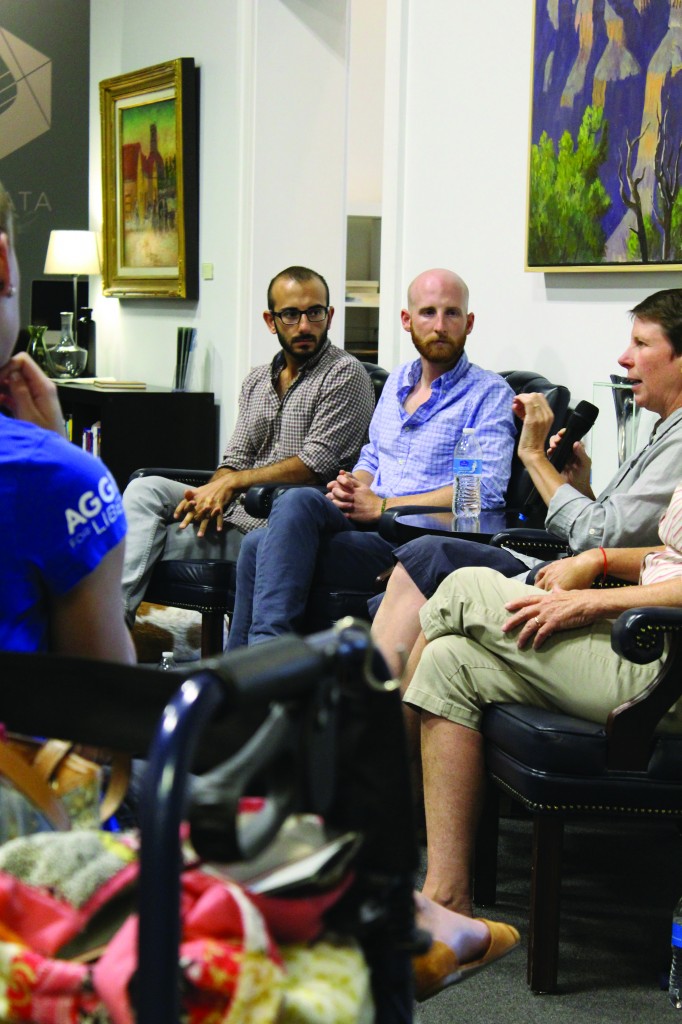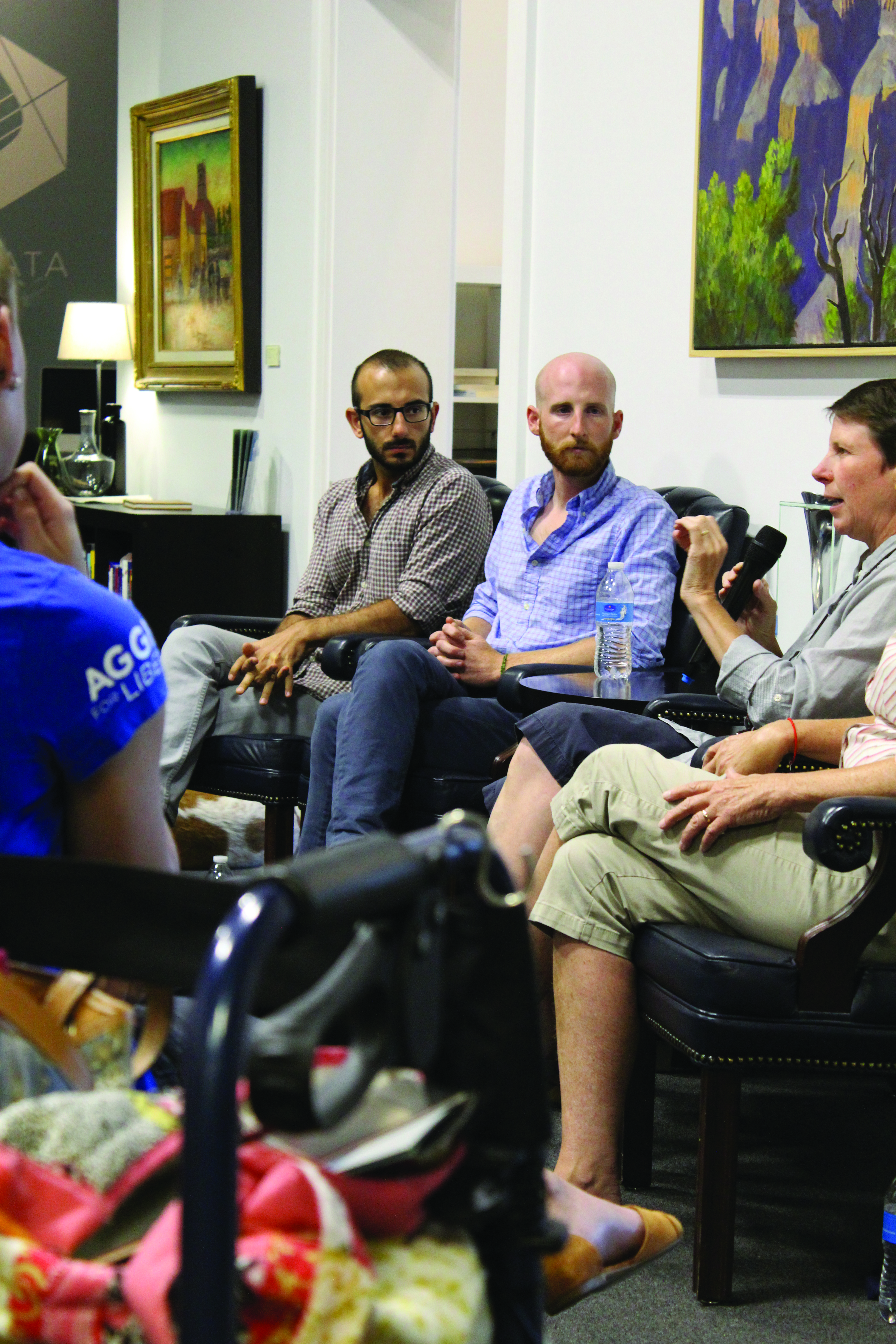Court’s decision looming

Jeffrey Dahdah photo Moudi Sbeity and Dereck Kitchen, two of the plaintiffs, speak to a crowd of students and Cache Valley residents in August 2014.
Jeffrey Dahdah
news editor
In November of 2004 citizens in Utah voted in Constitutional Amendment 3, which defines marriage as a union between strictly a man and a woman, into the state constitution. Almost 10 years later on March 25, 2013 six plaintiffs –Derek Kitchen, Moudi Sbeity, Laurie Wood, Kody Partridge, Karen Archer and Kate Call– sued the state for not allowing them to marry their respective partners.
“I think there are many people that would have stepped up if they could have, but they didn’t have that luxury,” Partridge said. “We felt very fortunate that we could join the suit on amendment three and we are pleased with where we are today.”
On Dec. 20 judge Robert Shelby ruled amendment three was in violation of the United State’s guarantee of equal protection in the US District Court for Utah. For 17 days, until Gov. Gary Herbert and the state appealed the decision, same-sex marriage was legal in Utah.
“We had several students that were able to get married during the time that it was legal in Utah,” said Brooke Lambert, Utah State’s programing coordinator for lesbian, gay, bisexual, transgender, questioning and allied, or LGBTQA, students. “It’s been awesome other than them trying to figure out things like taxes and other things because initially Utah was trying to say that they still weren’t married and there were a lot of issues there.”
The case then went to the 10th District Court of Appeals in Denver, where the decision was upheld on June 25.
“I am disappointed with the decision from the 10th Circuit Court of Appeals in regards
to same-sex marriage,” Herbert said. “I believe states have the right to determine their laws regarding marriage. I am grateful the Court issued a stay to allow time to analyze the decision and our options. But as I have always said, all Utahns deserve clarity and finality regarding same-sex marriage and that will only come from the Supreme Court.”
The Supreme Court will now get to choose between three different same-sex marriage suits, including Herbert vs. Kitchen, to hear when they resume.
“We just hope that the Supreme Court will take the case that it sees fit,” Sbeity said. “We don’t know if it’s going to be our case or not, but we trust that they will choose the best case.”
It was a sentiment Wood echoed.
“We really want the Supreme Court to do something and take a case and we really want it to be the best case,” she said. “I have no imagination to think about what that even would be like.”
However, the plaintiffs are not bitter towards the state for fighting the decision all the way to the Supreme Court.
“I think that it’s easy to assume that we might be resentful of the state for arguing and appealing the decision to the supreme court, we actually have a different perspective,” Kitchen said. “For us we are somewhat grateful that they are willing to push the conversation forward.”
The plaintiffs are just happy they can be married in their home state.
“We love Utah, it’s our home, we didn’t want to be married anywhere else,” Wood said. “We’re so happy that we were married in our state and our state is at some point going to recognize marriage.”
The main argument against same-sex marriage is the argument for individual state’s rights. In 2004 all but two counties, Summit and Grand, voted for amendment three, including 75 percent of Cache County.
“I think it’s ironic honestly, just because of the conservativeness of the state,” Lambert said. “Obviously we’re a very Republican state and I believe I read a study the other day that said 60 percent of Republicans still don’t support marriage equality.”
However Lambert said she has already seen differences from the case on campus.
“I think it gives our students who identify as LGBT and it gives faculty and staff that identify as LGBT a little bit more validation in their relationships,” she said.
Wood has been pleased with the smoothness of the case as compared to similar cases in other states.
“One of the things that I really like about this state as compared to some of the other things I’ve read and seen is that it hasn’t turned at all ugly,” she said. “I don’t think there is big riffs that are going to be hard to mend or anything.”
It was an observation Partridge shared.
“I think there has been a certain level of respect given by even those who disagree with the suit,” she said.
Though it’s not clear if the Supreme Court will take Utah’s case, they will most likely take a same-sex marriage case and make a decision one way or the other.
“Ideally whatever the decision is we move forward from it,” Lambert said. “I would hope that there wouldn’t be any conflict on either side regardless of what the outcome is. I would hope that we would be able to move forward with that decision as a campus community.”
–dahdahjm@gmail.com
@dahdahUSU

